Back in the winter of 1978 I joined a special British Airways guided tour to Moscow. In those days visiting Russian was not the carefree enterprise it is today. It needed copious amounts of planning and a steady nerve.
If memory serves me correctly, private independent visits were not permitted. Only tour groups, amply shepherded, were tolerated. I remember feeling very adventurous as I planned this escapade and had the sort of feelings that nowadays would be reserved for an excursion to North Korea.
Normally I would avoid packaged tours, preferring very much to do my own thing. But in the case of Russia in 1978 an organised tour was the only option for most people.
We turned out to be a rather select and varied group of around 15. One or two were obviously admirers of the USSR and were on pilgrimage. They were very boring. Most of us, though, were curious to see just what ordinary life in Moscow was all about and were well beyond any chance of indoctrination.
See more posters from the Soviet era
We were met at Sheremetyevo airport by a very large and rather forbidding lady from Intourist, the state (and only) tourist organisation.
Intourist is short for “The State Joint Stock Company on Foreign Tourism in USSR (GAO Intourist) of the People’s Commissariat for Foreign and Domestic Trade of the USSR”. The Soviets always did have a way with words, if with little else.
Lyudmila was to be our guide, protector and indoctrinator for the next five days. She looked like she could have kick-started an Ilyushin Il-86, so we resolved to comply meekly with her every command. At least, that was the intent but it didn’t work out quite to plan.
Indoctrination
When the coach arrived at the impressive Ukraina Hotel, one of those famous Stalinist wedding-cake confections, we were given just 30 minutes to check in and unpack. This sort of regimentation became par for the course. Then we were loaded into another Intourist bus for what soon became obvious was a non-stop course of indoctrination into the benefits of the Soviet system.
Nothing was optional, we had no choice of destination and every hour of the day was accounted for. I later realised that this was designed to keep us away from any aspect of life that didn’t show the system in good light. It was also to deny us any contact with the civilian population.
Careering down one of the eerily traffic-free boulevards on that first afternoon, we were treated to a pre-arranged script from Ludmila who was firmly in charge of the microphone on the front bench.
This, she said, pointing in the direction of a large statue in a small park, is the great philosopher Karl Marx. From the back of the bus came an irreverant cockney voice, loud and clear: “We have them in London, they’re called Marks and Spencer.” Queen Lyudmila was not amused. But she’d probably heard it all before.
On this day we were extremely tired tourists, having endured the four-hour flight from London, a lengthy immigration process and the indignity of being shuttled around Moscow in a fast bus. Finally, we were released to our hotel at six and went gratefully upstairs to get ready for what was billed as a welcoming banquet.
I can’t remember much about the food, but it was certainly adequate. Later, we sat sweltering at the long dinner table in the presence of the redoubtable Lyudmila. One of my abiding memories of that time in Russia was of freezing outside temperatures and over-heated interiors.
Cosmetics
As the dishes were cleared, Lyudy rummaged in her voluminous faux-leather handbag and produced what we all assumed was a mini drainpipe — a black plastic canister of uncharted provenance and even more nebulous function. All eyes turned to Lyudmila as she attempted to wield the unwieldy. What was she up to, we all wondered? We were not left in doubt for long.
Lyudmila purposefully twisted the bottom of the pipe and a long and thick red sausage emerged as if by magic. We were all transfixed by this apparition, wondering what would happen next.
Heaven forfend, we all realised, it must be Soviet lipstick. Slowly, ever so slowly, the red sausage began to wilt in the heat of the dining room and turned south at an alarming angle.
Lyudmila offered it up to her ample lips just before the business end could drop into the ashtray. Practice makes perfect. Oblivious to the attention, she nonchalantly coaxed the waxy wurst back into its container. After initial amusement, we all felt sorry for the indignity she had suffered. We became rather fond of the long-suffering Lyudmila after that.
I treasure this memory as evidence of all that was wrong with Russian communism (and any form of Marzism, come to that). The Soviets could put a man in space but couldn’t make lipstick. At least the colour was full of revolutionary zeal.
Glum and gum
In those days, long before Gorbachev and the fall of the Berlin Wall, life in Moscow was pretty grim to western eyes. Stores were bare, with tastefully balanced displays of the few available goods teetering in the shop windows. Some windows were actually empty, a poster being the only promise of interior delights.
Most of the goods were shoddy and second rate. The people looked exceedingly glum and wherever we stopped we were besieged by young people begging chewing gum.
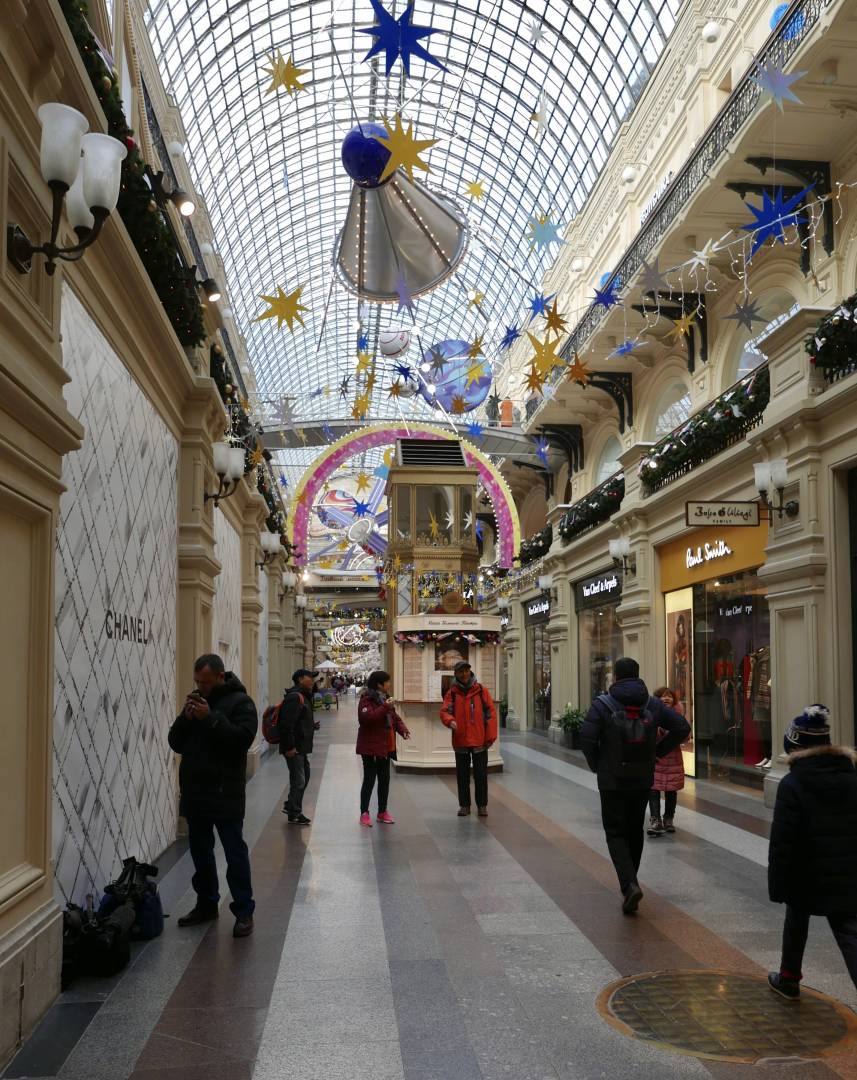
Which brings us to the subject of gum, or GUM. In case you think it stands for genitourinary medicine, let me tell you that it really means “Main Universal Store” (Государственный универсальный магазин). Oddly, the name and the building on Red Square have survived. By all accounts, GUM has been transformed into a sort of Harrods on the Moskva. As we shall see, it is soon to be home to The Genitourinary Leica Boutique.
Incidentally, just to dispel a common myth, the name Red Square has nothing to do with Lenin and his motley crew. It means “Beautiful Square” (Krasnaya Ploschad). Krasnii in old Russian meant “beautiful” and only later came to represent the colour. It turned out to be a happy coincidence for Lenin and that’s why many people still think it was named in honour of the revolution.
Revolution
After four days of being shepherded around countless statues, memorials and wonders of Soviet endeavour, not to mention standing in line in freezing cold outside Lenin’s tomb in Red Square, most of us were pretty fed up with the ceaseless propaganda.
We asked Lyudmila if we could visit the nearby GUM department store. “Nyet! Tomorrow we go to the Exhibition of Achievements of National Economy and there is no time for you to visit GUM.”
I objected and said I wouldn’t go to see yet more propaganda. I would visit GUM, if necessary alone, so there!. That set the seeds of revolution and no fewer than twelve of our number defected to my party. I have to admit I was worried. Would Lyudmila report me to the KGB have me arrested for subversion?
On the following day the Intourist bus, with Lyudmila in her usual seat in front of the microphone, departed for the park of Soviet achievement with just two of our number on board. Again, our long-suffering guide was not amused. No doubt I had been written off as a fascist.
Like some pocket Mao, I set off on the long march with my revolutionary comrades. Into the opulent depths of the Moscow metro we went and made our way without hitch to Red Square. We actually met real live Russians for the first time (a disintegrating Lenin having been our only previous encounter other than With Lyudmila). They were a bit perplexed to find a whole tour-load of westerners on the train. I image it was a very unusual sight at the time.
Within the hour, we were in GUM and, frankly, we soon realised just why Lyudmila was so keen for us not to see it. If this was the Main Universal Store, heaven help the rest of them.
Goodbye Zorki, hello Leica
It’s good, though, to see that GUM is still flourishing under its capitalist makeover. And soon one of those little shopping alcoves will become a Leica Boutique. I’d like to think it’s the same little booth where I saw Zorkis for sale in 1978.
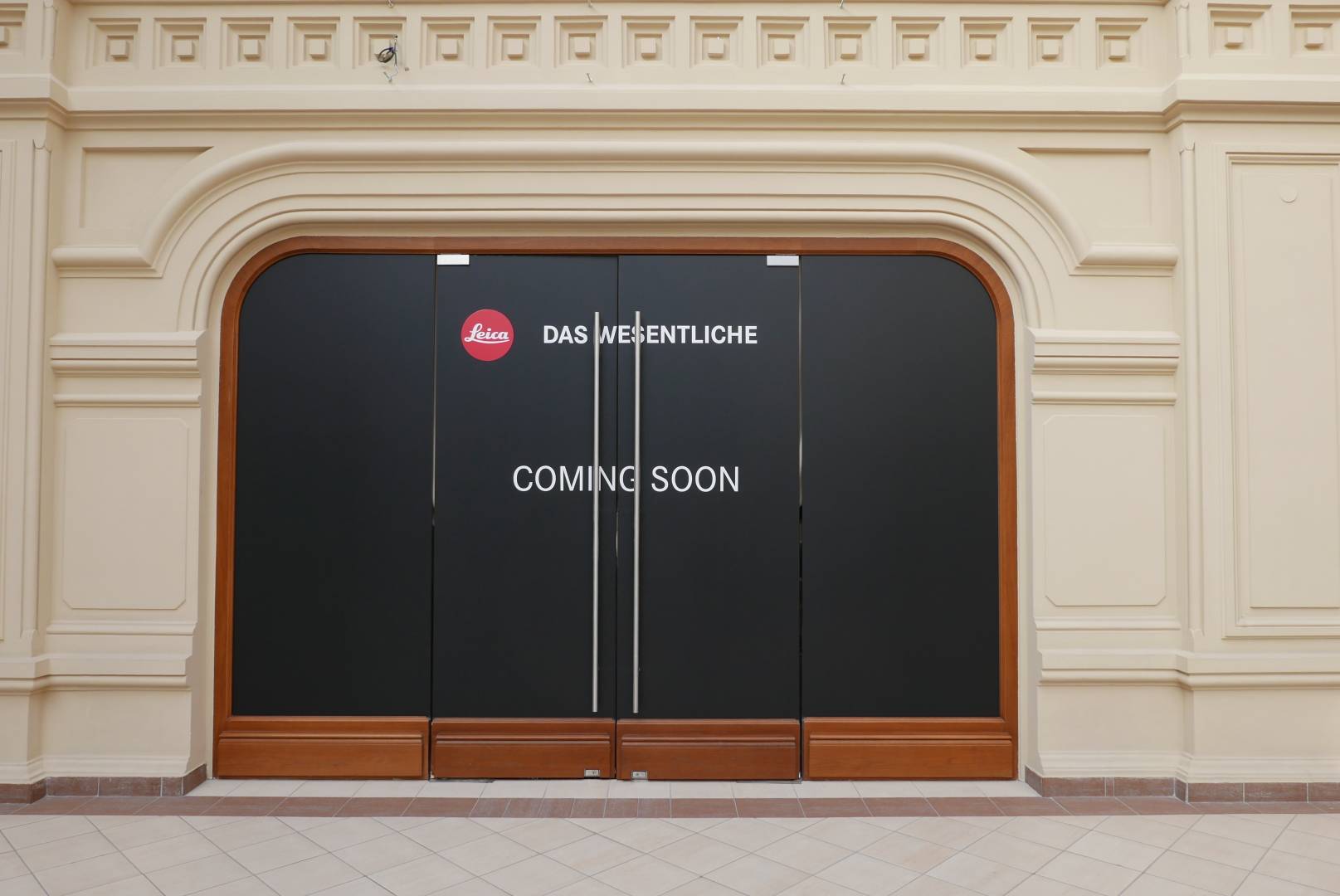
So that was my first impressions of Moscow. But another little anecdote to add to the flavour. When our group gathered at the airport at the end of our visit, one lady was missing. Like Iris Henderson in The Lady Vanishes, she had disappeared without a trace. And, as it turned out, the event was shrouded in similar mystery.
She was a rather intense and rather disconnected individual who hadn’t mixed with us at all. In fact, come to think of it, she hadn’t joined all of our daily tours.
We thought little of it until, back in London, I saw a news report clearly showing our erstwhile companion standing in Red Square, handing out leaflets protesting against the incarceration of some poor dissident whose name I can’t now remember. Evidently she had been arrested and was still in Moscow. I often wondered what became of her.
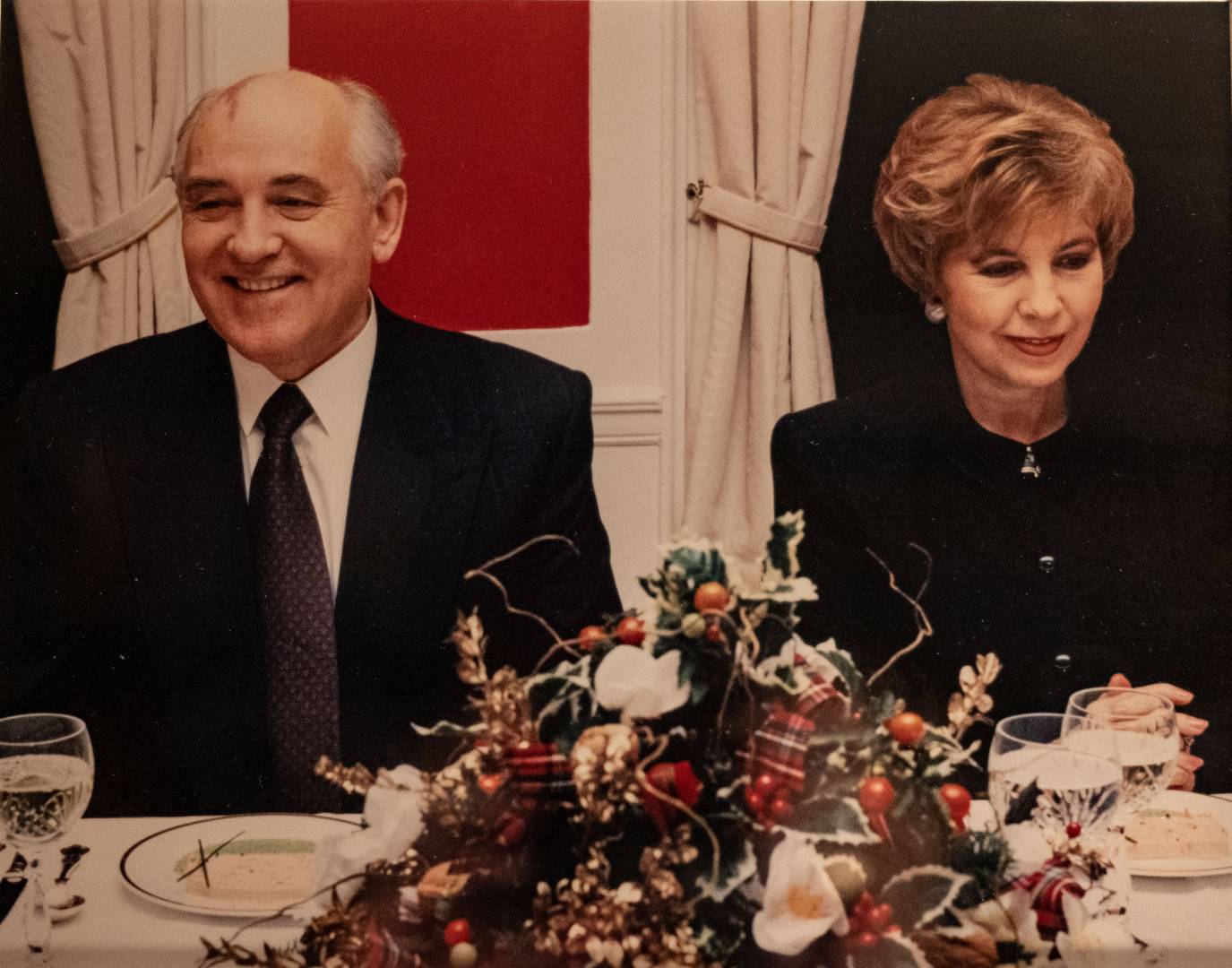
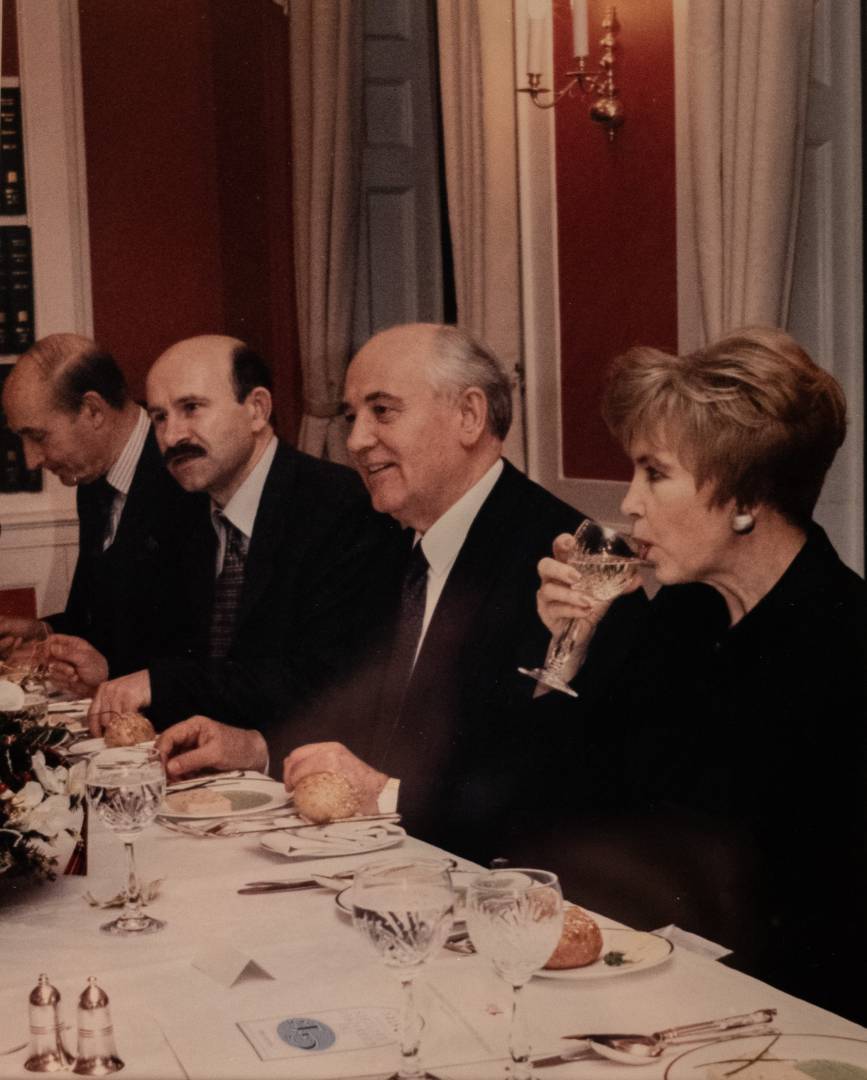
Gorby comes to dine
Fast forward fifteen years to 1993 and I was to see Russia from a very different and rather elevated angle. My company was responsible for organising the British speaking tour of Mikhail Gorbachev in that year.
At the end of the tour former Russian General Secretary and his wife, Raisa Gorbacheva, came to our offices in Little College Street, hard by the Palace of Westminster, to meet various distinguished British politicians over dinner.
I intend to write a little more about this in the future, but here are a couple of shots of your editor and the Russian statesman just to whet your appetite.
As I handed him my pen (a silver Montblanc which I had purchased in Berlin the day after the wall fell) to sign our visitors’ book, I reflected on GUM and dear old Lyudmila with her wonderful lipstick.
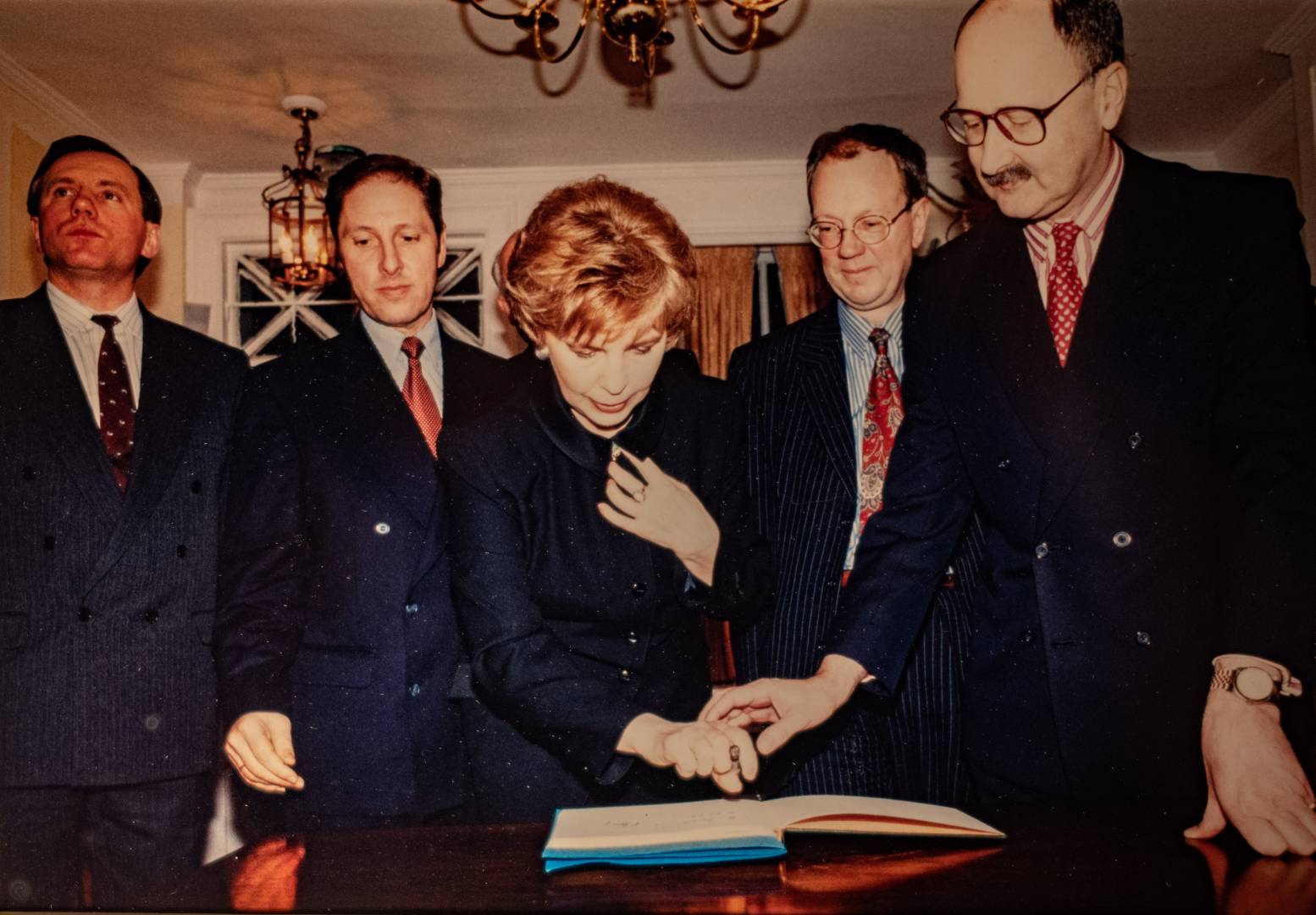

Editor’s Note: It was an email from Macfilos reader Tony Vidler, who has just returned from Moscow, that inspired this little anecdote. He discovered the nascent Leica Store in GUM and sent a couple of pictures (taken with his Leica D-Lux 109) to illustrate the scene. Sadly I don’t have any pictures from 1978 to add more atmosphere. Thanks, Tony, and we look forward to seeing more of Moscow, especially through the 45mm f/2.8 lens of your new Sigma fp.

Fascinating article, Mike. I am more than impressed with the high circles in which you moved, as well as your undercover activities. Is your current role as editor of Macfilos merely a sophisticated front for your real role in high politics and espionage?
I visited Yugoslavia on business in the Tito era. Although life there was nowhere near as austere as Soviet Russia, it was pretty unlovely in some ways. I remember shopping and the process involved three stages: stage one was to decide what you wanted and whether the shop actually had it in stock. Stage two was to go and queue to pay in full and be given a certificate which confirmed payment and allowed one to go to another queue where in Stage three one handed over ones certificate in exchange for the goods one wanted. Nothing was easy.
Yes, Macfilos is a front. Cunning, don’t you think? No one would have ever thought it until your mention. Anyway, I’ve sold the Aston Martin and I didn’t go to Cambridge, so I can’t be the real deal.
Sold the Aston Martin? ..No, no, no, I don’t buy that: it’s just waiting in a garage somewhere till you drive it up to Skyfall with Judi Dench, er, I mean ‘M’..
Thank you for another story from a world that’s (mostly) long gone. In the Americas we heard general impressions but never any details about life in European communist countries. It’s fascinating to read first hand accounts of experiences like yours. Please keep them coming!
This is Mike Evanski reporting from Moscow. Having gone rogue agent, and under cover.
I really enjoyed this vignette of Russian life. It is a country that has long held my interest, and i would love to the Siberian express with a camera in hand.
I am glad you explained which one you were in the photo – for a moment my eyes saw Captain Peacock in Are you being served – (sorry) my grandparents subject me to that weekly as a child, along with It ain’t half hot mum. The things adults did us kids in the 70’s… lol.
Yes, 25 years have wrought a change. I hadn’t thought of Captain Peacock but I think of a better one from that series. I’ll soon be Young Mr. Grace, though.
Hi Mike — I’m pleased to have sparked so many great memories of Moscow. On my visit the weather was “warm” so they said for the time of year – i.e. no snow — but grey, damp and overcast. So little joy in outdoor pictures. Im at present sorting the images from the new Sigma Fp with the 45/2.8 lens. So far it seems really competitive with the SL, but needs a handgrip (came today) and a smaller evf than the one they market. For auto shooting it’s perfect; for M or R lenses it has focus peaking and enlargement – but you have to rely on the screen – I hope they will bring out a top loading evf – TL2 style. Then weighing only 422 grams – 637 with the 45/2.8 it’s a very pocketable gem.
Thanks, Tony. I will be interested to get my hands on one and see how it feels. I agree about the smaller EVF but understood that there was no connector.
If I had know you were that close to Raisa I would have included my photo of her grave at Novodevichy Cemetery in my article about Russia last year. I am sending it to you by email now. I did, however, include a splendid line of brass ducks which had been presented to Raisa by Barbara Bush.They looked splendid in the snow in a park near the cemetery.
I did not visit the Leica Stores in Moscow (there wasn’t one in GUM at the time) and St Petersburg, although I did note online that prices in Leica Stores in Russia were higher than those in Western Europe. I found a nice little store, called Photo Lubitel, selling vintage cameras and lenses in St Petersburg where I bought a Jupiter lens and turret finder. The young man behind the counter looked at my M10 and told me that Russian people could not afford Leicas.
William
There are clearly *some* Russian people who can afford Leicas, not to mention English football clubs.
Prime Minister (Chairman of the Council of Ministers) Medvedev is a keen user of Leicas.
William
Brings back memories of the Moscow Olympics back in the Bulganin and Kruschov era. We foreign journos and photographers were all put into a state run hotel in Red Square very near to the famous shop you mention and which we could use as it only took Western as opposed to Russian Currency.
The Hotel lift was also most interesting as it only stopped at alternate floors because as we soon learned the floors between were listening floors from where the Russian secret Police could hear every word any of us said, about which we soon learned to take advantage, for instance via several of us gathering together in one room and saying things like ‘You know its not bad hear, far better than expected, indeed if our rooms had a TV it would be as good as a western hotel’
Thus my rooms TV was delivered the very next morning and so it went on, and by then we had also learned if anything really did need to be discussed in private, the the cleverest way of doing so was either to leave the Hotel (When we were always followed) or to go into the lavatory, turn all the taps on full, and say what we had to say whilst also flushing the loo so those down in the listening floor below could not make out what was being said.
All in all everything worked out quite well, or at least it did until the third week of the stifling hot and steamy games and after what seemed to be no ending mosquito bites causing such as myself and others to go down with a very severe dose of dissentry, indeed for several days I was so ill my rooms toilet was forced to work overtime, and the noise factor did not go down well with the KGB listeners from the floor below.
The first thing I knew about it was when they came up and smashed my rooms toilets door down, and to this day I can still see the two very large burly blokes standing over me with pistols in holsters looking down at me with undisguised disdain. Not a single word was said especially by me as I was so ill I could not have cared less, and they having seen that it was what it was looked down with disgust before just turning round and storming out again.
Nothing much else happened. I bought some Russian Dolls for my wife at the GUM shop, the games themselves were terrific, my badly smashed toilet door had been replaced by next morning, and finally after the games a spontaneous cheer went up from passengers and crew when the British Airways pilot announced we had just left Russian on our way home. I had loved almost all of it but have never wished to go back since.
All good stuff, Don. I forgot to mention that in the Ukraina Hotel a babushka sat outside the lifts on every landing and scrutinised comings and goings. I’ve heard the story of alternative floors before but I have no idea if that happened in the hotel when I stayed. On a similar note, I was visiting the Palast Hotel in East Berlin in the mid-eighties together with a couple of friends. They had taken a small gas stove into the hotel so they could make tea. While they were brewing, the phone rang and they were told in no uncertain terms to turn off the gas. While I agree with the sentiment — I thought it very foolish to bring a stove into any hotel — the question remained as to how the hotel staff had known. We pulled away the cabinet between the beds and found the microphone poking up behind the furniture. From then on I always said positive things to the listeners…..